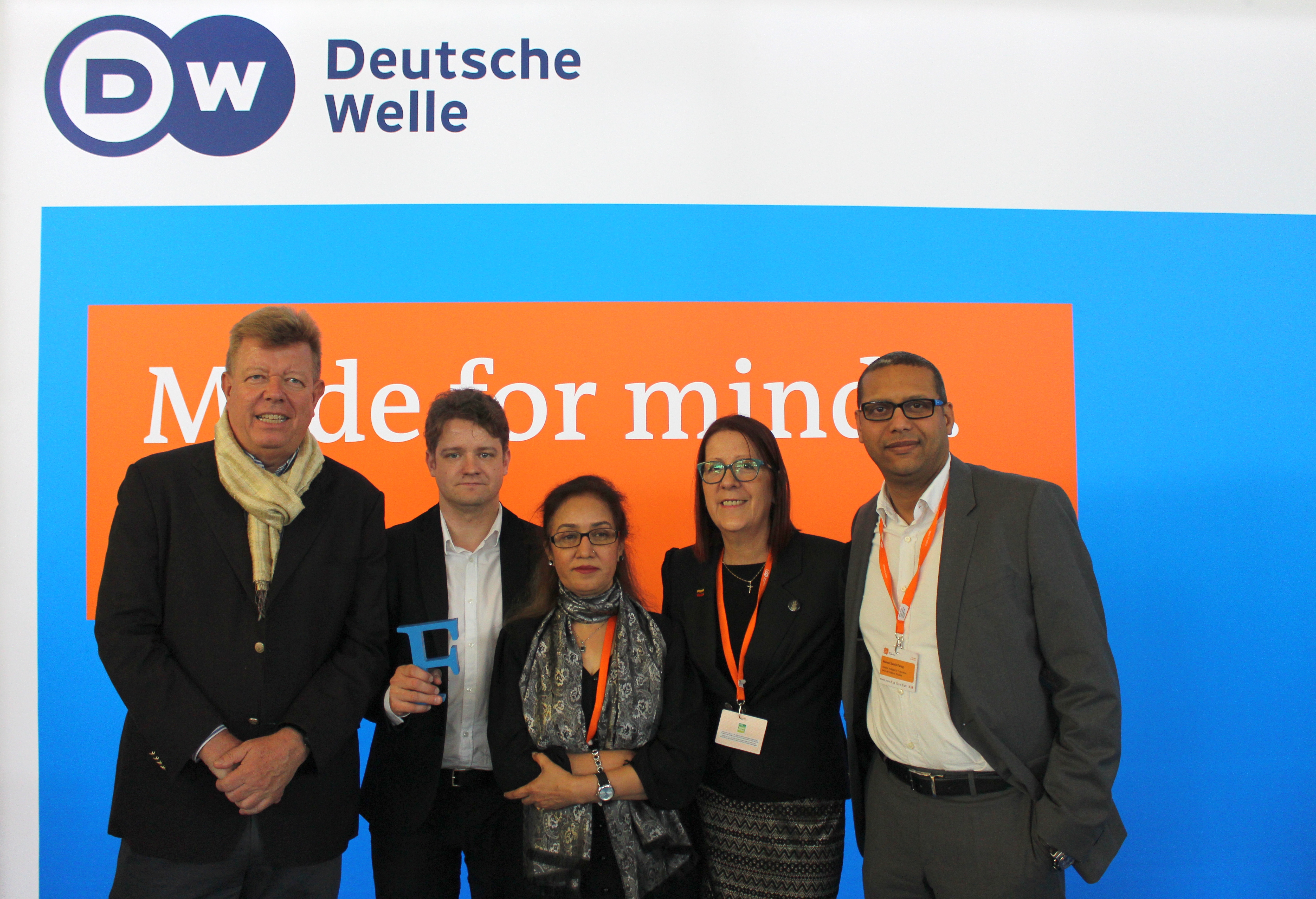Deutsche Welle's Global Media Forum 2016

Speakers in FNF Panel on Shrinking Democratic Spaces during GMF 2016
Every June Bonn turns into a media Mecca for a few days. This is when Deutsche Welle (German Broadcasting) hosts the Global Media Forum (GMF). The three-day conference is a top global event combining media, politics and international cooperation.
Topics are selected with great care: the motto of the ninth year of the conference was "Media, Freedom, Values".
Once again over 2000 guests arrived; they came from over 100 countries and gathered in the renovated halls of the old parliament. Most were involved in media, but they were joined by representatives of civil society and politicians from near and far. This is a good mix when it comes to getting a picture of the state of media in the world, gaining information about the opportunities in this field, but also the numerous challenges.
The Global Media Forum is also intended as a forum for the presentation of innovative concepts. What matters is not so much technological aspects, as this is not a technology fair. Of primary importance are the socio-political effects of developments in media, a process which never stops.
Paradigm shift
A paradigm shift has taken place: long gone are the optimism and hype of previous years when it comes to social media. Digital networks such as Facebook, Twitter and YouTube were once dreamily declared as political saviours, but the mood has soured. Not too long ago, speakers from Arabia and Africa came to Bonn and celebrated the emancipative power of social media. Now experts connect these same media more with manipulation and disinformation.
"In the digital age it has become significantly easier to spread false information and manipulation", said Deutsche Welle Director Peter Limbourg. In a video message to delegates President Joachim Gauck repeated this sad thesis almost word-for-word.
Manipulation and falsification are one aspect of the problem, limitation on freedom of the press and opinion are another. With respect to these basic liberties the world has become a worse place, as proven by international studies.
Limitations on freedom of the media are not only set by government prohibitions and censorship. Even more treacherous, and sometimes dangerous, is the illiberal work of so-called non-government parties. When terrorist groups attack the media and murder journalists, this creates fear, which in many places is a step towards self-censorship.
We even see this in Western democracies, although the erosion of journalistic liberty in states of the Arab world, and in parts of Asia and Africa, where liberal journalists fear for their lives, is even more dramatic.
The limitations on freedom of opinion have far-reaching political consequences: „The end of freedom of opinion is the beginning of the end of democracy", Limbourg summarizes. Supporting international media therefore means supporting democracy. Deutsche Welle and its DW Academy perform an important service in this area.
During the course of the forum, the discussion also turned to Germany. Speakers from Germany pointed out the danger that comes from populists defaming the media as the "lying press". Delegates from countries in which journalists are killed on a regular basis see this as a trifling problem.
The fact that nowadays we have more information at our disposal than ever before in human history is blamed on social media. "But does this mean that we are truly better informed?" asked – rhetorically of course – the programming director of Deutsche Welle Gerda Meuer.
Much of what flitters over our screens is of limited use. Aside from garbage, spam and endless banality the Internet is increasingly becoming a preferred channel for disseminating dangerous content. But is a myth that the radicalisation of the Jihad only happens through online-channels, explained a professor from Paris.
The "trigger" which sets off the slide into Islamic violence is usually an experience in the real world. Still: electronic media have long since become a means of recruitment for international terrorism and thus a weapon in the fight of the enemies to freedom against the values of the Western World.
Censorship and prohibition alone are not suitable means in containing the danger. One tried-and-true method is furthering the media competence of citizens. This is up to the schools, universities, and media itself.
You do not protect freedom by throwing it out through the back door. This is one of the central messages of the discussions in Bonn.
Freedom is something of great value, which needs to be protected and supported – even on the level of international relations. It is good that freedom was one of the main topics at the Global Media Forum; it is even better that this topic is long since an integral part of the program of the German broadcaster.
Ronald Meinardus
Regional Director, Friedrich Naumann Foundation for Freedom South Asia
Learn how FNF participates in GMF below:
In a playlist on our Youtube Channel, FreedomTV Europe, you can watch short interviews with three out of the four panelists in this year's FNF panel and the moderator.
More information regarding the FNF's panel discussion during GMF on shrinking democratic spaces.